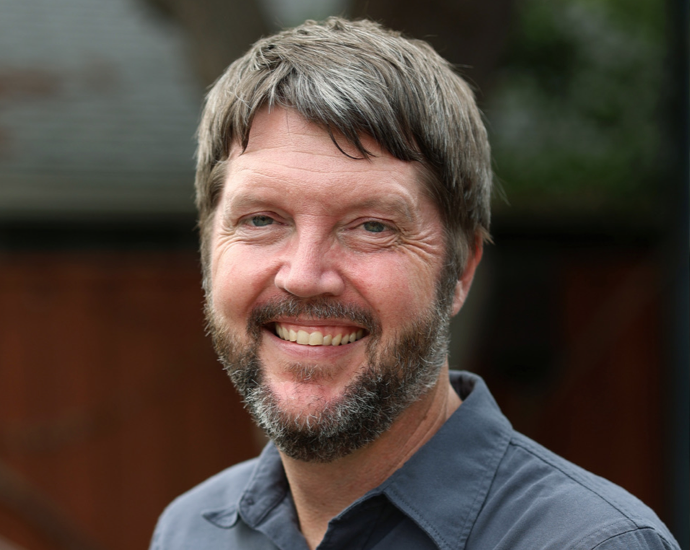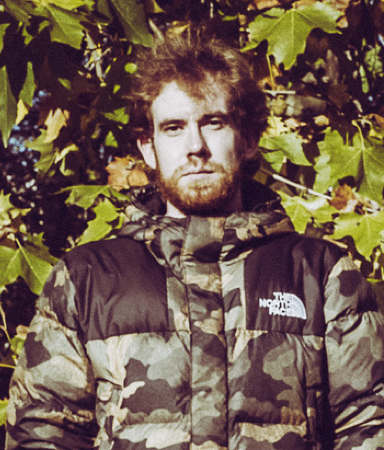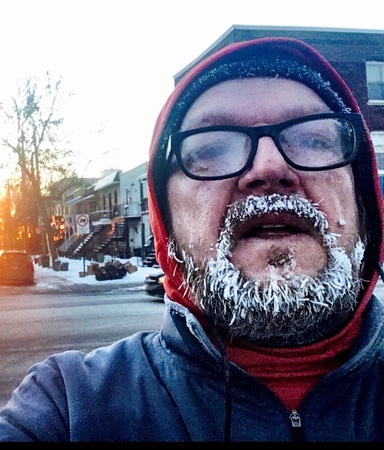Where are you based?
Studio City, CA.
Where do you work? What do you do?
I am a podcast producer and engineer. I worked at CONAN and Team Coco for 12 years where I did whatever I was called upon to do. One of those things was engineering the Conan O’Brien Needs A Friend podcast. I went independent last year and started a podcast production company called Jett Road Studios. I love comedy, and before CONAN performed at the Upright Citizens Brigade Theater NYC in the early 2000s, so a lot of my clients tend to be from the comedy world.
What are you listening to?
The podcasts that are currently in heavy rotation are Pod Save America, The Daily, and Inside The Recording Studio. The Pod Save America hosts have such a great rapport, and I think I might listen more because of that than the politics. The Daily is fairly dry (except for the bizarre “what else… you-need-to-know-today” line which I find amusing), but it is a great resource if you want a primer on a specific news story. Inside The Recording Studio is hosted by two audio engineers who talk about recording gear and workflow. Even though it is geared toward music production, I still learn a lot from listening to the episodes that relate to what I do in the podcast space. The hosts don’t always agree, and those might be my favourite parts of the show because you get a detailed breakdown of two equally valid approaches to the same problem.
How do you discover new music and/or podcasts?
When I was at Team Coco I was very much part of an ecosystem and would find out about shows either by working on them or finding out about them from co-workers. I think it was 2010 when I first heard about WTF with Marc Maron from the very funny CONAN writer Todd Levin, so that was word of mouth. I engineered Pen Pals with Rory Scovel and Daniel Van Kirk when their podcast was on Team Coco, and they had great guests on that show. I think The HoneyDew with Ryan Sickler was the show I was most happy to discover through that experience. Conan O’Brien Needs A Friend was a co-production with Earwolf (both are SiriusXM companies now), so I’ll find out about some shows off their Instagram. Comedy Bang Bang World is the only paywall network I subscribe to. I almost think of it as the new (or old) Earwolf, as it is run by Scott Aukerman, Brett Morris is the lead engineer, and it has a similar scrappy spirit to the old days. On CBBW you can find really funny people like Paul F. Tompkins, Andy Daly, and Seth Morris (his Bob Ducca character is an all-time favourite). I would like to be better about listening to more scripted podcasts. Matt Powers, who also used to work at Team Coco, is super-talented, and I am always impressed by his projects like SMARTR and The Weird Place with Dana Carvey. My writer friend Brad Listi hosts an excellent literary podcast called otherppl, and he has been raving about Valley Heat. That might be the next scripted show I listen to. As far as mailing lists go I subscribe to Hotpod and PodNews which are both solid but tend to be more about networks and trends and less about specific shows. But if you want to verify that The Joe Rogan Experience is still #1 on Spotify, they make it easy for you.
What formats do you usually listen to? LP, CD, Cassette, Digital, Streaming Services? Why?
I almost exclusively use Apple Podcasts for podcasts, and Spotify for music. I liked Stitcher (RIP) and used that pretty heavily, especially when Team Coco started working with Earwolf (which was a part of Stitcher and Midroll at the time). As a podcast producer the hosting services (Simplecast, Libsyn, etc) publish your show to all the various podcast platforms (Apple, Spotify, Google Podcasts, etc), but you usually still need to upload to YouTube directly. I often hear people refer to YouTube as a “discovery platform,” meaning people might find your show on YouTube, but then subscribe to it elsewhere, so it is important to figure out your relationship with YouTube if you want to make sure you are reaching your audience. It doesn’t matter if your podcast incorporates video or not, you need a YouTube presence to cover all the bases. Patreon is interesting as it is a peer-to-peer/DIY platform (at least that is how I think of it), but I just read they partnered with Spotify, so we’ll see how Patreon evolves.
I am not sure where I fall on the audio snob spectrum. If given a choice between an MP3 and a WAV, of course, I am going to choose the WAV. But I do think a high-bitrate MP3 is fine as a listening format. What I care about as an audio engineer is recording and mixing in the highest quality format possible, and then dumbing it down at the last stage of the process if an MP3 is the final product. I am a fan of both analogue and digital, and I am excited about the advent of the hybrid studio. I love combining classic mics and outboard gear with modern software and interfaces to maximize what both do well.
As a listener I love vinyl, especially for jazz and musicians I grew up listening to like of Neil Young and John Prine. I think it is an exciting time, and digital and analogue should be thought of as complimentary, instead of adversarial.
“I am a fan of both analogue and digital, and I am excited about the advent of the hybrid studio. I love combining classic mics and outboard gear with modern software and interfaces to maximize what both do well.”
Where do you do most of your music listening?
I do the bulk of my podcast listening in the car. You are a captive audience, and it is an intimate and controlled environment. Before This American Life started calling itself a podcast, I remember listening to the endings of episodes while still parked before work (my commute was slightly shorter than the episode run times). I usually listen to podcasts I am curious about in the studio. I use a UA Apollo system (Apollo Twin X expanded via ADAT) with Kali LP-6 studios monitors. A lot of times I’ll put on a podcast I’ve been meaning to check out while I am rewiring, or doing something else that doesn’t require 100% of my brain. In the studio, I also have a 70s-era Pioneer turntable hooked up to a newer Sony receiver and Klipsch Reference speakers. I use that system mainly to listen to records, but it also has Bluetooth capabilities which is handy. I used to be in a vinyl listening club that met monthly, and a couple of those guys had insane setups with top-of-the-line turntables and tube preamps etc. I love that sort of thing, but I don’t see myself going down that rabbit hole any time soon. But man, those systems sound good.
How do you find and listen to pre-release music?
I love the podcast development process. Friends or prospective clients will often send me a pilot (or proof-of-concept) to either get an opinion on it or explore the idea of working together. Starting a podcast can be very exciting, but it is also important to know that it is a huge commitment. So the main things I am listening for when it comes to a new podcast (weekly shows in particular) are things like 1) Is the show unique enough to fill or create its own niche? 2) Does the show idea have legs i.e. will episode #125 be as good as episode #5? 3) Does the host feel comfortable in the chair, really care about the show, and have the stamina/attention span to withstand the grind of hosting a podcast? The audience-building process is a slow burn, especially for people without name recognition. But even the Conan O’Briens of the world have to grind it out to build and maintain their audience. And things like ad reads can be mind-numbing, especially if the copy is repetitive. The main example that comes to mind is when Pod Save America does a SimpliSafe ad, they always use one “real life example,” which is the fact that Jon Lovett loves it and set it up himself. Always. They use this example even if Lovett isn’t there. No matter how funny and quick on your feet you are, on occasion you will just have to push through and “make the doughnuts” (apologies for the arcane reference). So when I listen to something before it has been released or greenlit, that is what is going through my mind.
What are your frustrations with listening to music digitally? Any benefits?
Digital audio is the norm now, and I am at peace with that. The only thing that irritates me is when I hear a podcast where they obviously used Zoom audio as their source. I understand using Zoom audio as a backup or as a last resort, but when I hear “professional” shows using it as the guest audio for a full-length podcast I am a bit disappointed with that show. The nature of that audio is pretty abrasive, and I think it cuts the audience’s attention span in half. It also reminds me of being on a work Zoom during lockdown, and that isn’t a good thing. I think about 10-15 minutes is the limit for obviously inferior audio. Anything longer than that should be recorded well if at all possible.
How do you keep track of everything you are listening to?
I try to add a show on Apple Podcasts the moment I become aware of it, and that becomes my to-do list for discovering new shows. At one point I was straddling Apple Podcasts and Stitcher, but that made things confusing as oftentimes I couldn’t remember which platform I used for that particular show. As a podcast producer, I have to keep tabs on the different listening services (like Spotify which in some cases you have to use), but as a consumer, I find the one-platform approach less cluttered when possible.
Do you tip other people off to new music? How?
I am always happy to recommend podcasts to people, which happens a fair amount when they find out what I do. Usually, I’ll ask them what podcasts or radio shows they like, and then try to recommend something similar, but maybe slightly less well-known. Side Note: This question reminds me of a time I was talking to a friend who was looking for new bands to listen to, so I asked them what they were listening to at the time. They said, “The Breeders” (I think this was around ‘94 or so). I jokingly replied, “I hear the Pixies are pretty good,” but somehow they hadn’t heard of the Pixies! I was a bit jealous as I lent them my Surfer Rosa CD to listen to for the first time.
Anything you want to “promote”?
I am very happy to be the engineer of the podcast Unsound Advice with Lara Beitz. It is Produced by J.P. Buck, who was the standup booker, as well as segment producer for CONAN and The Tonight Show. Lara is not only really funny (she is a Comedy Store regular and tours with Marc Maron), but she is someone who is constantly working on herself, so an advice show is a perfect fit for her. Her comedian friends were always asking her for advice, so Pete Holmes recommended her to J.P. as someone to build a show around. It has been amazing to have people like Ron Funches and Taylor Tomlinson come to the studio and to be able to see (and hear) their minds work in real-time. I’ve also been impressed by other comics who just weren’t on my radar, like Sarah Tiana, Dan Donohue, and Aida Rodriguez. I look forward to every session.




